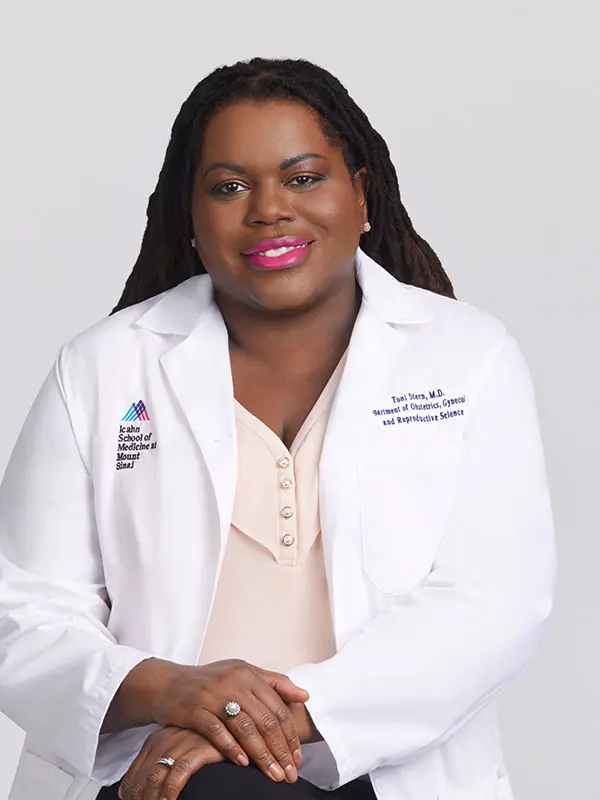The nation’s history of social and systemic racism has led to inequities in health care, evidenced by disproportionately high rates of Black maternal morbidity and mortality. A group of residents in the Raquel and Jaime Gilinski Department of Obstetrics, Gynecology and Reproductive Science at the Icahn School of Medicine at Mount Sinai considered these daunting nationwide trends and decided to take action and create an Anti-Racism Task Force.
“We see stark racial and ethnic disparities in maternal morbidity and mortality rates. Many of these outcomes persist, even when you control for education, age, and geographic location within the country,” says Toni Stern, MD, MS, MBA, Mount Sinai Health System Vice Chair, Quality, Diversity, Equity and Inclusion, in the Department of Obstetrics, Gynecology and Reproductive Science, Icahn Mount Sinai.
For residents, the need for action felt immediate. “In June of 2020, there was so much going on in the country—George Floyd’s murder and other state-sanctioned violence and anti-Black racism, and Black Lives Matter marches,” says Krupa Harishankar, MD, who is one of the initiators of the Task Force and is now an attending in OB/GYN at Elmhurst Hospital Center in Queens. “For me,” she explains, “the impetus was walking through police barricades from my home in Harlem to go the hospital and wondering how our patients coming in for induction of labor or emergencies were going to make it through.”
The Task Force was created by residents Adjoa Bucknor, MD, Natalie Cohen, MD, and Krupa Harishankar, MD, along with several faculty members and the support of Michael Brodman, MD, Chair Emeritus of Obstetrics, Gynecology and Reproductive Science. They drafted an Anti-Racism Mission Statement, formed a variety of subcommittees addressing both clinical and nonclinical areas, developed a list of goals pertaining to each subcommittee, and recruited additional members. The efforts continue to be strengthened under the leadership of Joanne Stone, MD, MS, Chair of the Department of Obstetrics, Gynecology and Reproductive Science.
The task force is continually developing new approaches to improve the quality of obstetric care for women of color.
The OB/GYN Anti-Racism Task Force has kept a sharp focus on the department’s patients, with subcommittees taking on a variety of projects. One of the first initiatives of the Ambulatory Care Subcommittee was a survey to assess how patients experienced their care and any racial bias.
The Education and Recruitment Subcommittee worked on improving the recruitment of resident physicians underrepresented in medicine. “By revamping our screening process and inviting more faculty of color to participate in the selection of applicants and interviews, we were able to ensure that at least a third or more applicants that were considered for our program were monitories,” says Dr. Bucknor, who is now an attending OB/GYN and Assistant Program Director at The Mount Sinai Hospital. “Furthermore, we started hosting an annual diversity event aimed at connecting prospective applicants with faculty, fellows, and residents of color in order to create a space for growing mentorship. Our hope is to continue to not only promote diversity in the residency but also in our department in general.”
The Advocacy Subcommittee explored access to doula services for birthing people of color. Research has shown that there are significant benefits to having the support of a doula from pregnancy through childbirth. The Subcommittee is also working to increase awareness of doulas among patients of color. They developed a patient flyer that describes the benefits and provides contact information for resources within the community. The Labor and Delivery Unit Subcommittee worked with interdisciplinary team members to create a urine toxicology policy for the prenatal and postpartum period with a specific focus on equitable practices, including written consent for drug screening and linkage to care, as required.
The Task Force also looks to educate its members and other Health System staff. The Advocacy Subcommittee participated in a Legislative Advocacy Day, which enabled residents to learn about relevant laws and explore how physicians could bring their unique perspectives into the governing process.
The Task Force is continually developing new approaches to improve the quality of obstetric care for women of color. “The key is that there’s no right place to start. You just begin with an idea and build your team,” says Dr. Harishankar. “That team will grow and change over time, but if you have a strong foundational idea, you can have a real impact.”
Dr. Stern explains the bottom line: “We continually aim to develop a data-driven quality and process improvement infrastructure to inform the evaluation of perinatal metrics associated with severe obstetric morbidity and mortality through an equity lens.”
Featured

Krupa Harishankar, MD
Attending in Obstetrics and Gynecology, Elmhurst Hospital Center, Queens

Adjoa Bucknor, MD
Attending in Obstetrics and Gynecology, and Assistant Program Director, The Mount Sinai Hospital

Toni Stern, MD, MS, MBA
Mount Sinai Health System Vice Chair, Quality, Diversity, Equity and Inclusion, in the Department of Obstetrics, Gynecology and Reproductive Science
